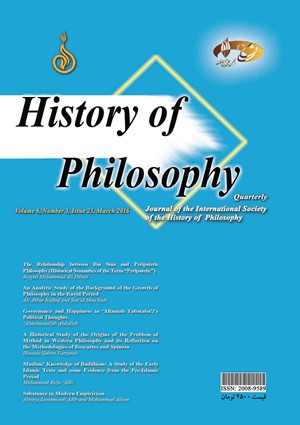Substance in Modern Empiricism
Subject Areas : Geneology of philosophical schools and IdeasAlireza Javanmardi Adib 1 , Mohammad Akvan 2
1 -
2 -
Keywords: Substance rationalism empiricism primary qualities Locke Berkeley Hume secondary qualities,
Abstract :
The epistemological approach to Empiricism in the Modern era is opposed to the rationalist approach of Descartes and his followers, who believed in the existence of certain innate ideas prior to experience in Man’s mind. The thinkers advocating this approach explored rationalists’ metaphysical problems through denying innate ideas and considering sense experience as the source of knowledge. The results of such investigations had nothing to say, even at their peak, about substance except when trying to deny it. Accordingly, given the process of the development of empiricism by the pioneers of this approach and its consequences, the authors of this paper have tried to deal with the following basic question: After accepting the specific reading of some empiricists such as Locke, Berkeley, and Hume from the process of attaining knowledge, would it be possible to accept the existence of substance? Here, the writers respond that, based on their studies of the above thinkers’ views of substance, the acceptance of substance is not consistent with empiricism. This is because substance is a meta-empirical entity which sense experience cannot grasp. What follows sense experience in the end is nothing but a collection of impressions which can never explain the existence of substance.
بزرگمهر، منوچهر، فلاسفه تجربي انگلستان، ج1، لاک و بارکلي، تهران، انتشارات مؤسسه پژوهشي حکمت و فلسفه ايران، چ2، تهران، 1384.#
برکلي، جورج، درباره اصول دانش انسان از مجموعه فيلسوفان انگليسي از بيکن تا ميل، نيويورک، 1939.م#
حلبي، علي¬اصغر، تاريخ سير فلسفه در اروپا، انتشارات تهران، ج1، چ1، نشر قطره، 1383.#
خاتمي، محمود، مدخل فلسفه غرب معاصر، باهتمام مريم سعادت، تهران انتشارات نشر علم، چ1، تهران، 1386.#
خراساني، شرف الدين، از برنو تا کانت، تهران انتشارات شرکت علمي فرهنگي، چ2، 1376. #
دادبه، اصغر، کليات فلسفه، تهران انتشارات دانشگاه پيام نور، چ33، 1385.#
دکارت، رنه، گفتار در روش درست راه بردن عقل و جستجوي حقيقت در علوم، ترجمه محمدعلي فروغي، ضميمه جلد اول سير حکمت در اروپا، تهران، انتشارات زوار، چ7، 1379¬.#
دکارت، رنه، تأملات، ترجمه احمد احمدي، تهران، انتشارات مرکز نشر دانشگاهي، چ1، تهران، 1361.#
سبحاني، جعفر، شناخت در فلسفه اسلامي، تهران، انتشارات برهان، چ1، تهران، 1375.#
فروغي، محمدعلي، سير حکمت در اروپا، تهران، انتشارات زوار، ج1، چ7، 1379¬.#
کاپلستون، فردريک، تاريخ فلسفه، ج4، از دکارت تا لايب¬نيتس، ترجمه غلامرضا اعواني، تهران، انتشارات علمي و فرهنگي، چ3، 1386.#
لاک، جان، تحقيق درباره فهم انسان، از کتاب فيلسوفان انگليسي از بيکن تا ميل، نيويورک، 1939.م.#
گنجي، محمد حسين، کليات فلسفه، تهران انتشارات سازمان مطالعه و تدوين کتب علوم انساني دانشگاهها (سمت)، چ4، 1387.#
مگي، بريان، فلاسفه بزرگ، ترجمه عزت الله فولادوند، تهران، انتشارات خوارزمي، چ3، 1385.#
نقيب¬زاده، ميرعبدالحسين، درآمدي بر فلسفه، تهران، انتشارات طهوري، چ8، 1385.#
نقيب¬زاده، ميرعبدالحسين، فلسفه کانت، بيداري از خواب دگماتيسم بر زمينه سير فلسفه دوران نو، تهران، انتشارات آگاه، چ4، 1384.#
هالينگ ديل، رجينالد جان، تاريخ فلسفه غرب، ترجمه عبدالحسين آذرنگ، تهران، انتشارات ققنوس، چ5، 1384¬.#
Descartes, Philosophical Writings, tr. by Elizabeth Anscombe and Peter Thomas Geach, Nelson’s, University Paperbacks, 1976.#
John Lock, An Essay Concerning Human Understanding, four books, Gent, the fifth editon, with large additions, London, Thoemmes Press, 2003.#
George Berkeley, A Treatise Concerning the Principles of Human Knowledge, edited by Jonatan Dancy, Oxford, New York, Oxford, University Press, 1998.#
David Hume, Enquiry, Concerning Human Understanding and Other Writings, edied by Stephen Buckle, Cambridge University Press, 2007.#


